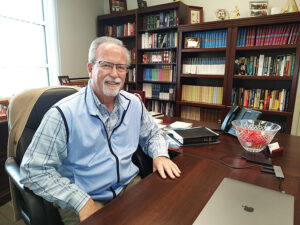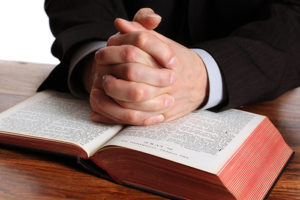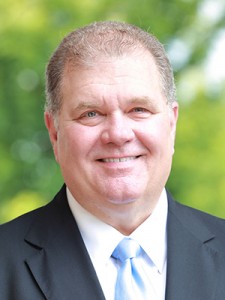
In May of last year, pastor Keith Vaughan of Valley Grove Baptist Church in Knoxville left his office with the intention of leaving the ministry and never returning. After some intervention and assistance from the Shepherd’s Care ministry of the Tennessee Baptist Mission Board, Vaughan is back in the office and preaching the Word and caring for his flock once again.
KNOXVILLE — May 22, 2022 will forever be etched in the memory of Keith Vaughan, pastor of Valley Grove Baptist Church in Knoxville.
That was the day of what he now refers to as “The Breakdown” occurred.
He recalled walking into his office on that Monday morning. “Nothing really happened that doesn’t normally happen on a Monday in a Baptist church,” he said.
“But for some reason, all of a sudden, I just knew I could not do this (pastor) anymore.” Vaughan got up from his desk, walked out the door, locked it and left the office.
When Vaughan got to his car, he called his wife, Edna, but “I could not talk. I was so emotional.” He finally was able to tell her, “I can’t do this anymore. I don’t have any desire, I don’t have any will, I just don’t feel like I could face one more person.”
Intervention
Vaughan said that as he left his office that day, he sensed that the Holy Spirit was leading him to call Randy Davis, president and executive director of the Tennessee Baptist Mission Board. Vaughan and Valley Grove had participated the previous night in a joint worship service with other congregations at nearby First Baptist Church in Seymour.
Davis spoke that night about how important it is to support pastors. “It was a message that I had heard Randy preach at various locations and times where he encouraged people to encourage and love their pastors. … It resonated with me that night.”
Vaughan called Davis and left a message and within 15 minutes, Davis returned the call. It took a while for Vaughan to share his story “because I literally could not speak without crying.”
Davis immediately recognized that Vaughan was dealing with burnout. He recalled that Davis went through a list of about 10 things and asked if Vaughan was experiencing any of those signs of burnout. “Of those 10 things, nine of them described me perfectly,” he said.
He noted that Davis shared that he had experienced the same thing in his ministry and suggested some things that Vaughan could do immediately. He then told the struggling pastor about Shepherd Care, a ministry provided by the TBMB.
A licensed counselor contacted Vaughan the next day and set up an appointment, with the cost covered by the TBMB. At Davis’ suggestion, the pastor also met with his personal doctor.
“And that began the process of healing and coming back,” he recalled.
 Vaughan called four of Valley Grove’s deacons and explained his situation.
Vaughan called four of Valley Grove’s deacons and explained his situation.
“All four of them were very supportive and asked how they could help,” Vaughan said.
He originally was given a six-week leave of absence but it was later extended several more weeks when his counselor felt he was not ready to return. Vaughan had taken it a step further. He had already decided he would never go back. “I had no desire to, to minister. I had no desire to preach.”
The desire not to preach was foreign to Vaughan. “There has never been a doubt in my mind about the calling of God in my life. I believe he called me to preach. I loved to preach,” he said, even though he had come to the point he did not want to return to the pulpit.
Return to the pulpit
After more counseling and a lot of prayer, including staff and members from Valley Grove, Vaughan returned to the pulpit nearly three months after “The Breakdown.”
“When I came back, my wife and I decided that the best thing for us, and I believed the best thing for the church, was for me to fully explain what had happened to me,” Vaughan said.
He acknowledged that not everyone agreed with that decision, but he strongly felt it was best for him and the congregation to be completely open.
 “I knew that the only way I was going to get through this, and the only way that I thought I could eventually be able to help somebody else get through a similar situation, was to explain how I felt and what had happened.
“I knew that the only way I was going to get through this, and the only way that I thought I could eventually be able to help somebody else get through a similar situation, was to explain how I felt and what had happened.
Vaughan preached series of sermons on things he had learned about himself and what led to his burnout. The messages included sermons on doubt and fear.
“Those messages produced a lot of conversation between me and members of the congregation, some of whom acknowledged they had felt that same thing.
“But I didn’t know anybody else had ever felt that way. I’ve always believed that everything that God allows us to go through, He will use it for His glory and for our good. I believed then and believe now that the reason I was allowed to go through this is that I would be able to encourage somebody else who might be going through the same thing,” he affirmed.
He also has heard from others, including a former college classmate he has not seen in 30 years who also is a pastor. He shared that he had been going through the same thing, but he had not told anyone.
“I got to reconnect with him and encourage him to do what Randy Davis encouraged me to do. … By reminding him that there is light at the end of this tunnel, and God’s going to get you through this.”
The main difference in that counsel was that “I was not just saying that because I’m a pastor and that’s what I was supposed to say. I said it because I had just gone through it.”
Reflecting on why it happened
Nearly a year has passed since he broke down and sought help and Vaughan has a better perspective on how he finally reached his breaking point.
Now in his 40th year of ministry, Vaughan noted that in 39 years he never took a sabbatical, only a week of vacation occasionally.
He noted that he began his ministry in an era in Southern Baptist life when “you didn’t take sabbaticals, you didn’t have close friends or any of the things that they now tell me would have prevented or could have helped prevent a breakdown like this. I was taught those things were not necessary,” he said.
Vaughan observed that “pastors do a great job of putting on the mask that needs to be put on so they can do their job. And I did that for a long time.
“Nobody would’ve known I was struggling with depression and with anxiety because when I walked in the door, I was able, at least up until May 22nd, to pull it together long enough to do what I had to do and then get out and crash. But the church never saw the crash and I made sure they didn’t.”
He noted there are a lot of pastors who are doing exactly what he did, citing research in March from the Barna Group (barna.com) that indicates about 42 percent of pastors have considered quitting.
“They walk into the building and they put on the mask, the mask that needs to be put on to do the job,” he said. “And when they walk out of there, they hate their life. If I can do something to encourage them the way Randy Davis encouraged me, that’s what I want to do.”
Prevention
Vaughan suggested several things that pastors and ministers can do to prevent burnout in their ministry.
 • Take a sabbatical or at least take all of your allotted vacation time, he stressed. Vaughan encouraged church leaders to insist that their pastor take a sabbatical every five to six years. The length of time depends on the individual congregation, but it is extremely important for both the pastor and the church, he said.
• Take a sabbatical or at least take all of your allotted vacation time, he stressed. Vaughan encouraged church leaders to insist that their pastor take a sabbatical every five to six years. The length of time depends on the individual congregation, but it is extremely important for both the pastor and the church, he said.
• Vaughan said he wishes he had been encouraged to build a support network with other pastors and ministers early in his ministry. “This is not a competition (between churches and ministers). We’re on the same team. We need to learn, as pastors, to rejoice when God is blessing someone else.”
• Take care of your family. “Think about the people you know who are no longer in church because their dad was a pastor and was married to the church or the church people did something to harm their families,” he suggested. During his ministry, Vaughan told search committees that if there was ever a decision to choose between the church or his family, he would choose his family. His family knew that, he said.
“One of the reasons my breakdown didn’t happen 10 years ago instead of last May was because of the support of my wife (Edna) and two children and grandchildren,” Vaughan affirmed.
“Their support enabled me to go as long as I did,” he said.
Help is available
One of the lessons Vaughan learned is that help is available through the Shepherd Care ministry of the TBMB.
“I’ll stand on the rooftop and shout the praises of Randy Davis and Sing Oldham, pastor engagement specialist for the Tennessee Baptist Mission Board.”
 He said he did not know Oldham previously but Oldham would call him often and check on him and ask how he could pray for him.
He said he did not know Oldham previously but Oldham would call him often and check on him and ask how he could pray for him.
“He would ask, ‘Is there anything else you need from us? Can we help in any way?’ That went a long way,” Vaughan affirmed.
A lifelong Baptist, Vaughan said he has always been proud of and supported the work of Southern Baptists.
“Never in my life have I been more proud than I am now because of the work that the TBMB does in supporting and helping pastors in this way,” Vaughan said. B&R — For information about Shepherd Care, contact Sing Oldham at soldham@tnbaptist.org.

